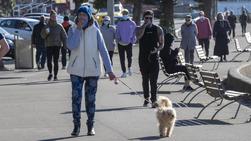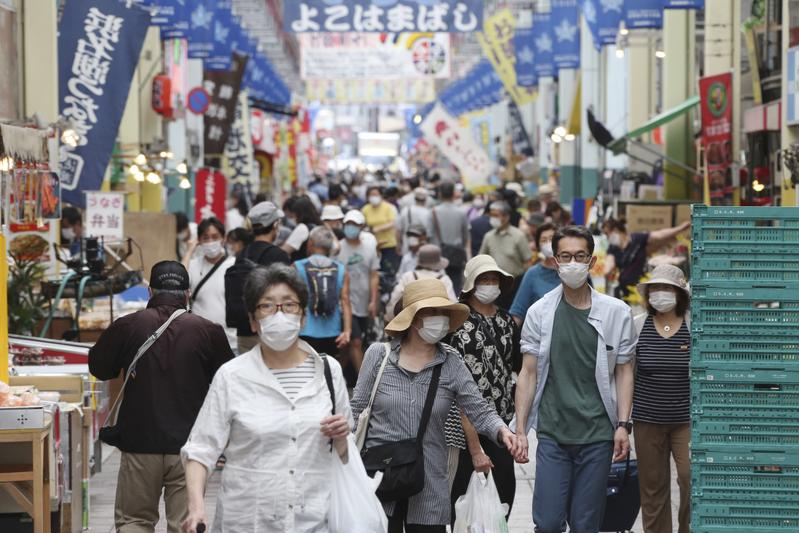 People, some wearing masks, walk along a path in Wellington, New Zealand, Aug 19, 2021. (MARK MITCHELL / NEW ZEALAND HERALD VIA AP)
People, some wearing masks, walk along a path in Wellington, New Zealand, Aug 19, 2021. (MARK MITCHELL / NEW ZEALAND HERALD VIA AP)
JERUSALEM / NEW DELHI / RAMALLAH / SEOUL / SINGAPORE / SYDNEY / TOKYO / VIENTIANE / WELLINGTON - New Zealand on Tuesday postponed its phased border re-opening plans until the end of February over concerns of the rapid global spread of the Omicron variant of the coronavirus.
The South Pacific nation had just started easing some of the world's toughest pandemic measures and its international border restrictions were to progressively loosen from January, with all foreign tourists allowed into the country from April.
Non-quarantine travel, which was to have opened for New Zealanders in Australia from Jan 16, would be pushed back until the end of February, COVID-19 Response Minister Chris Hipkins said at a press conference in Wellington.
New Zealand also said the length of stay in state quarantine facilities would be increased from a week to 10 days. The pre-departure test requirement to enter New Zealand was reduced from 72 hours to 48 hours before travel.
National airline Air New Zealand said it would cancel around 120 services through to the end of February due to the re-opening plans being pushed back, affecting about 27,000 customers.
 A medical worker collects a swab sample at a drive-through COVID-19 testing station in Melbourne, Australia, on Aug 19, 2021. (WILLIAM WEST / AFP)
A medical worker collects a swab sample at a drive-through COVID-19 testing station in Melbourne, Australia, on Aug 19, 2021. (WILLIAM WEST / AFP)
Australia
Australia must move past "the heavy hand of government" and authorities must stop shutting down people's lives with COVID-19 lockdowns, Prime Minister Scott Morrison said on Tuesday, as daily infections in the country shot up to a new pandemic high.
COVID-19 cases have been breaking records over the last several days, the surge fuelled by the more transmissible Omicron variant, but Morrison insisted that limiting the spread of the virus comes down to personal responsibility.
"We have got to get past the heavy hand of government and we have got to treat Australians like adults," Morrison told reporters, urging authorities to shift from "a culture of mandates" when it comes to masks and social distancing rules.
Despite the rapid spread of the Omicron variant, Federal Health Minister Greg Hunt said "only a fraction" of those cases were ending up in hospitals. The number of people in hospitals has been creeping up, but remains far lower than during the Delta wave.
Around 4,600 cases were reported in Australia on Tuesday, exceeding the previous high of some 4,100 over the weekend. New South Wales, home to Sydney, became the first Australian state to top 3,000 COVID-19 daily infections, while neighboring Victoria logged 1,245 cases. Other states have fewer cases.
ALSO READ: Australia's new COVID-19 cases hit record high
India
India has recorded 200 cases of the Omicron coronavirus variant across 12 states, mostly in the western state of Maharashtra and the nation's capital New Delhi, the health ministry said on Tuesday.
The country's tally of Omicron cases has nearly doubled within a week, but there have been no deaths reported so far. In less than 40 percent of cases, patients either fully recovered or were discharged, the data showed.
India has been accelerating its vaccination campaign amid fears of potential surges in infections, with at least one dose given to 87 percent of the eligible 944 million adults.
Israel
Israeli researchers have found that SARS-CoV-2, the virus that causes COVID-19, harms the human immune system, Ben-Gurion University in southern Israel said on Monday.
In a genetic study published in the journal iScience, BGU researchers tried to find out what causes the "stormy" nature of COVID-19, which is also manifested in an extreme reaction of the immune system.
For this purpose, they analyzed for a year, using computational biology, gene expression in patients from around the world.
The team examined whether mitochondria, cell organs that produce energy, are damaged during COVID-19 illness, resulting in dysfunction of the body. Surprisingly, the researchers identified damage to the mitochondria of immune system cells, rather than to lung cells' mitochondria.
The mitochondrial damage in immune cells explains the "cytokine storm" phenomenon, which is a reaction of the immune system, appearing with symptoms such as fever, swelling and extreme fatigue, the researchers said.
"Based on the results, it is possible to use existing treatments to target mitochondria and thus improve patients' condition," they concluded.
 People wearing face masks shop at a mall in Yokohama, near Tokyo, June 23, 2020. (KOJI SASAHARA / FILE / AP)
People wearing face masks shop at a mall in Yokohama, near Tokyo, June 23, 2020. (KOJI SASAHARA / FILE / AP)
Japan
The Japanese government on Monday launched a smartphone app that allows people to display proof of the COVID-19 vaccination that can be used for multiple purposes, including immigration procedures, local media reported.
According to the Digital Agency, the app is called the COVID-19 Vaccination Certificate Application and is available for both iPhone and Android smartphones, showing information including the number of doses a user has received, the dates of inoculation, and the vaccine manufacturer.
The app allows people to obtain vaccination certification through the "My Number" national identification system. All citizens and residents of Japan are issued 12-digit ID numbers, however, My Number cards need to be applied for separately.
By scanning their My Number cards with a smartphone, people can have their inoculation status displayed on the app. The vaccination information is saved in a cloud system created by the government, called the Vaccination Record System.
Kuwait
Kuwait will require anyone who has been fully vaccinated against COVID-19 for nine months to get a booster shot, the government communication center tweeted on Monday.
Kuwait will also require incoming travellers to quarantine at home for 10 days unless they receive a negative PCR test for the coronavirus within 72 hours of their arrival.
Laos
The number of COVID-19 cases in Laos has increased to 100,524 on Tuesday after 1,128 new cases were reported in the past 24 hours, according to the Lao Ministry of Health.
Laos has logged a total of 1,128 new cases over the past 24 hours including one imported case and 1,127 local transmissions, Deputy Director General of the Department of Communicable Diseases Control under Lao Ministry of Health Sisavath Soutthaniraxay told a press conference here on Tuesday.
Sisavath said 10 new deaths were recorded, bringing the death toll to 284 in the country as of Tuesday.
Palestine
The Palestinian government said on Monday that it approved the recommendations of the Ministry of Health to administer the third vaccine dose to all Palestinian citizens to combat the spread of the Omicron variant of COVID-19.
All citizens, who have received the first and second jabs six months ago, can receive the third one immediately, the government said in a press statement at the end of its weekly meeting held in the West Bank city of Ramallah, adding it decided to impose vaccination and require a certificate of vaccination for all arrivals to and departures from the West Bank.
 People cross a road along the Orchard Road shopping district in Singapore on Sept 7, 2021. (ROSLAN RAHMAN / AFP)
People cross a road along the Orchard Road shopping district in Singapore on Sept 7, 2021. (ROSLAN RAHMAN / AFP)
Singapore
Singapore's ministry of health said late on Monday preliminary tests had detected two suspected cases of the Omicron variant of COVID-19 linked to a gym, with results for a third coronavirus case related to the gym pending.
Singapore has reported 71 confirmed Omicron cases, with 65 imported infections and six local cases
The health ministry said it was conducting contact tracing related to all three cases, which have mild symptoms, had no recent travel history and had been double-vaccinated. The statement did not specify whether any of the cases had received a booster.
Singapore has reported 71 confirmed Omicron cases, with 65 imported infections and six local cases. "Given its high transmissibility and spread to many parts of the world, we should expect to find more Omicron cases at our borders and also within our community," the health ministry said.
With 87 percent of its 5.5 million population having been fully vaccinated, Singapore has turned to focus to administering boosters. About 34 percent of the city-state's residents have had a booster.
Cases in Singapore have fallen over the last few weeks from a record daily count of 5,324 in late October. It reported 195 new cases on Monday.
South Korea
South Korea registered a total of 119,098 breakthrough COVID-19 infections, which refer to the fully vaccinated people who were infected with the virus, the health authorities said Monday.
The number of those who tested positive for COVID-19 two weeks after the full vaccination stood at 119,098 as of Dec 12, up from 92,075 a week earlier, according to the Korea Disease Control and Prevention Agency.
Among the total breakthrough cases, the number of critically ill patients was 1,679. The death toll stood at 764.
Thailand
Thailand will reinstate its mandatory COVID-19 quarantine for foreign visitors and scrap a quarantine waiver from Tuesday due to concerns over the spread of the Omicron variant of the coronavirus.
The decision to halt Thailand's "Test and Go" waiver means visitors will have to undergo hotel quarantine, which ranges between 7 to 10 days.
Meanwhile, a so-called "sandbox" program, which requires visitors to remain in a specific location but allows them free movement outside of their accommodation, will also be suspended in all places except for the tourist resort island of Phuket.
"After Dec 21, there will be no new registrations for 'Test and Go', only quarantine or Phuket sandbox," said deputy government spokeswoman Rachada Dhanadirek.
About 200,000 visitors who had previously registered for the quarantine waiver and sandbox program will still be eligible, said government spokesman Thanakorn Wangboonkongchana.


